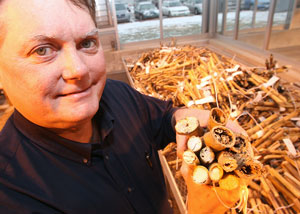Keeping on a mechanism in plants that naturally shuts down cellulose production could play a key role in enhancing biomass production for plant-based biofuels.
 Purdue University researcher Nicholas Carpita says they have discovered that small-interfering RNAs (siRNAs) play a normal role in plant development by shutting off genes involved in primary cell wall growth in order to begin development of thicker, secondary cell walls.
Purdue University researcher Nicholas Carpita says they have discovered that small-interfering RNAs (siRNAs) play a normal role in plant development by shutting off genes involved in primary cell wall growth in order to begin development of thicker, secondary cell walls.
“If we can learn to interfere with the down-regulation of cellulose synthesis, then plants may be able to produce more cellulose, which is key to biofuels production,” Carpita said.
A Purdue team made the discovery in barley after introducing a virus as a way to “silence” specific genes and study their functions. The researchers noticed that the virus had more effect then anticipated.
Carpita said this let researchers see that the siRNAs – among other things – regulate and shut down primary cell wall development to begin secondary wall growth. “These secondary stages result in characteristics such as tough rinds of corn stalks, vascular elements to conduct water and fibers for strength,” he said.
The researchers said that delaying or preventing the shutdown of both primary and secondary cellulose production might enhance total plant biomass.
Carpita’s research team reported its findings in the December 15 early online issue of the Proceedings of the National Academy of Sciences.

